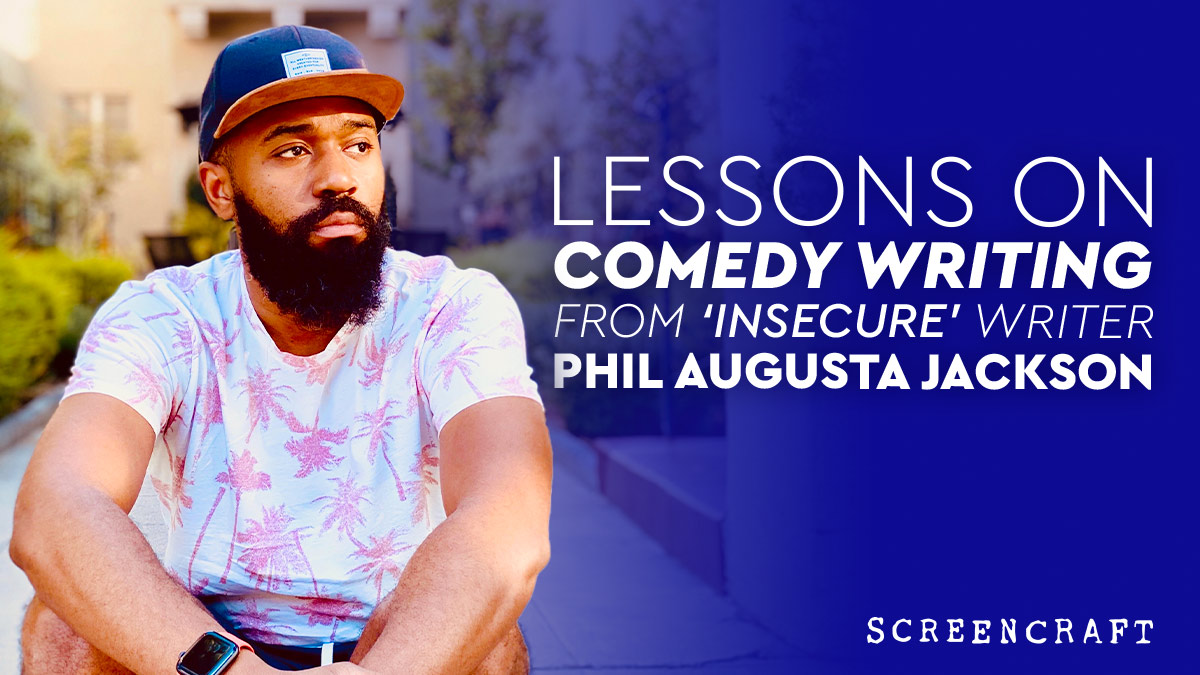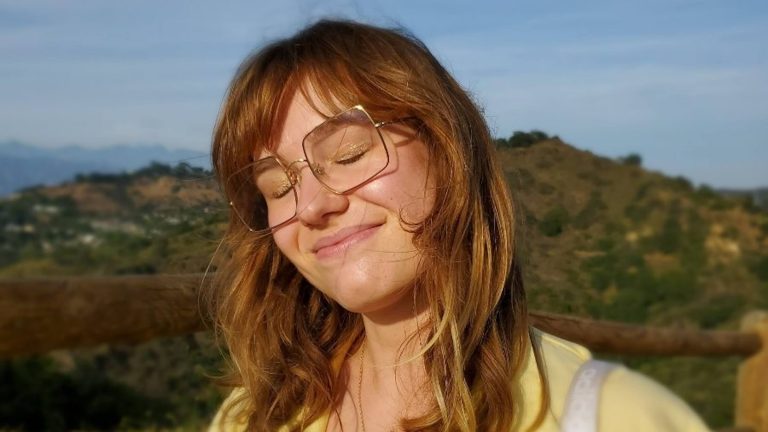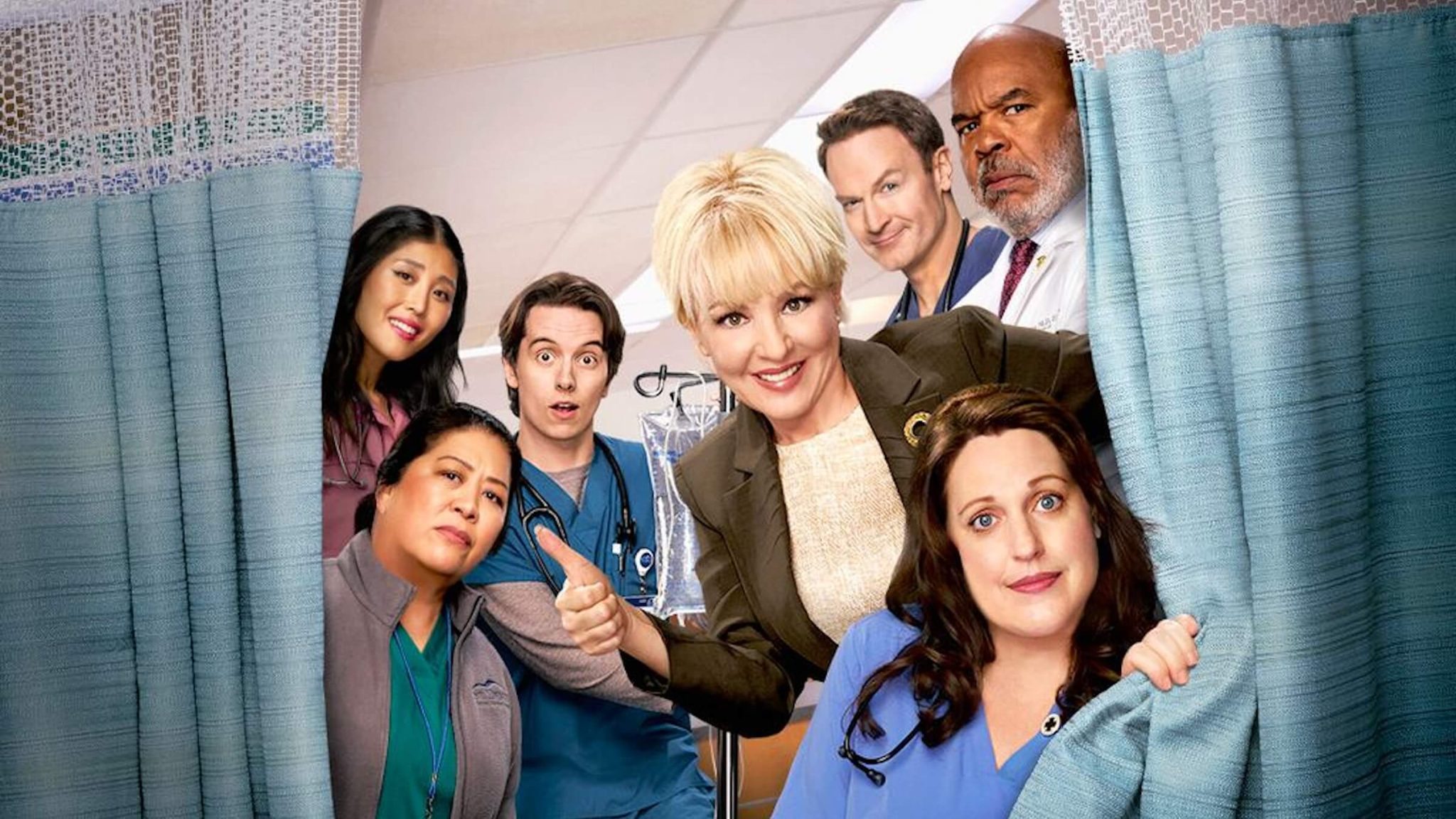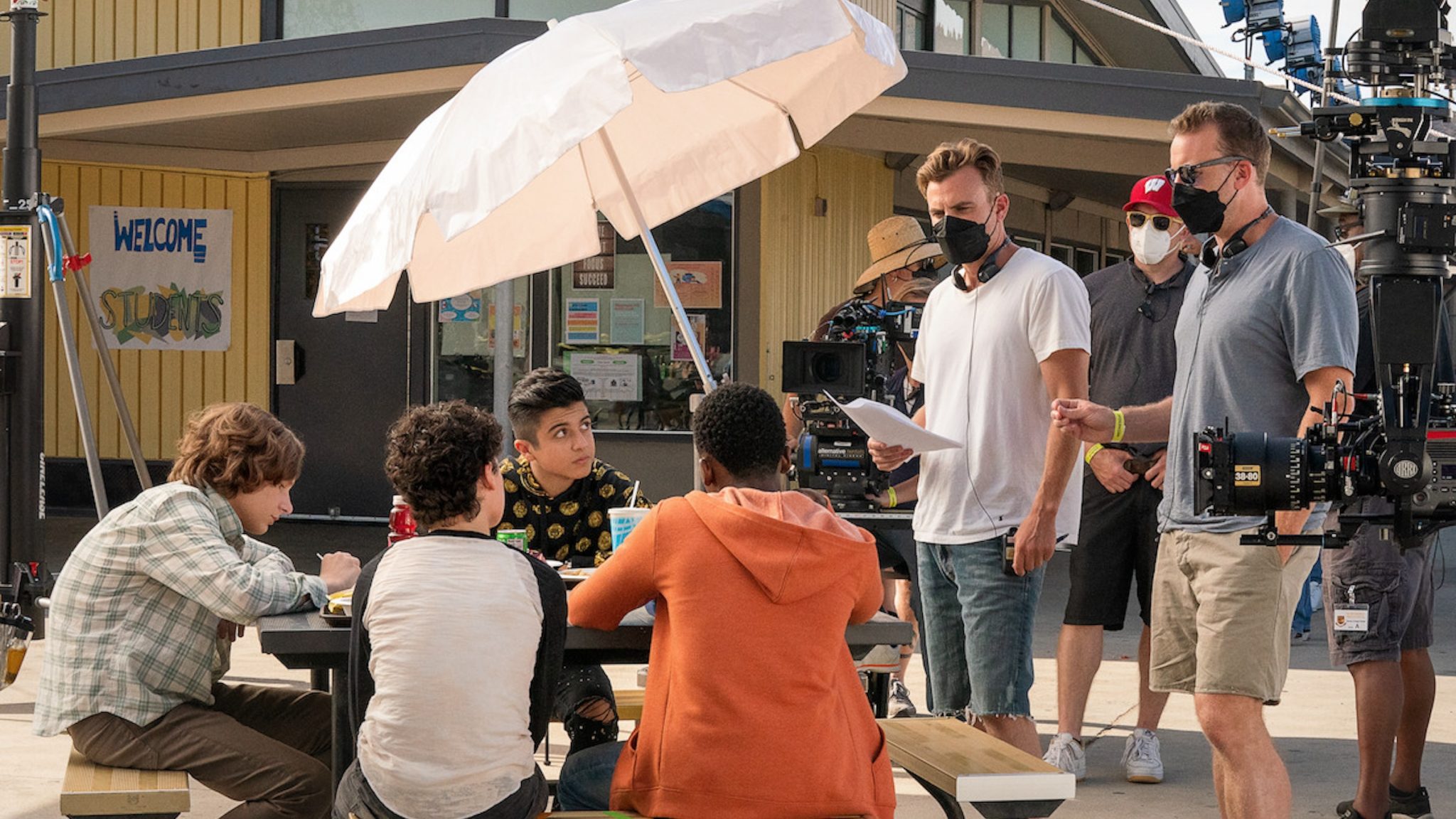Lessons on Comedy Writing from 'Insecure' Writer Phil Augusta Jackson

"Write it down. All of it. The half idea. The full idea. The play. The pilot. Whatever it is, just write it down. Every time you write, you’re sharpening the iron."
What is the most important aspect about writing comedy? Just make it funny, right? That's the key requirement right? I mean, yeah -- but if you ask a professional comedy writer, you quickly realize that there's so much more to not only the craft but the business as well.
We were lucky enough to talk in depth with one of our 2021 Comedy Screenwriting Competition judges, Emmy-nominated writer, TV producer, and performer Phil August Jackson, who has worked on titles such as HBO's Insecure, Brooklyn Nine-Nine, and his new show Grand Crew, which premieres on NBC in Fall 2021. He provided some incredible insight into his career, from how he got his foot in the door writing for Key & Peele to how he tackles writers block.
---
ScreenCraft: You started in advertising. How did you transition to writing full-time for Key & Peele?
Phil Augusta Jackson: So, I went to the University of Virginia and got a degree in Commerce with concentrations in marketing and management. The plan was to go to law school, but I deferred a year so that I could spend a year in New York City doing Strategic Planning at an advertising agency. About midway through that year, I realized that I didn’t want to study or practice law at all, so I ended up staying in New York City.
The beautiful thing about NYC is that it’s a creative mecca, and people are figuring themselves out and pursuing their dreams all the time. So a couple of years into my advertising gig, I started taking an acting class. The plan was to try and become an actor, but it was really hard getting auditions on top of having a full-time job. But my acting teacher would let me bring in scenes that I wrote for myself -- I figured if I couldn’t book a role, I could start writing for myself in the hopes that it would showcase my abilities.
"It still feels wild when I think about getting the call that I had booked it. I gave my ad job four days' notice and then left for Los Angeles."
A couple of months later, I had a full one-act play written, and the response to the play in my acting class was pretty positive, so I linked up with my friend and roommate at the time, Jeff, and we produced this play off off-Broadway at the 13th Street Repertory Theater. We ran that play for about a year and sold out that 70 seat theater almost every time -- but even then, I was thinking that it was a showcase of my acting ability rather than thinking I was an actual writer.
Soon after that in 2009, I started taking improv classes at the Upright Citizens Brigade Theater. And for the next four years, I was either performing, coaching, or teaching improv every night of the week, including weekends, unless I had a new business pitch or a big presentation at work.
After doing a bunch of shows and showcases, I got an agent after auditioning for an NBC show that was recasting a role. You need an agent to negotiate on your behalf when you test to be in a show, and I was on this agent’s radar already, so she handled that contract and then decided to keep working with me. So I was just repped for acting at that time. But then I wrote a pilot, another attempt to write something that I could see myself acting in. I sent that to my agent, and she decided to represent me for literary based on that script. After that, I submitted to a bunch of TV shows: e.g. - to SNL a bunch of times, Fallon, etc. as a writer and performer, and then my agent let me know that Key & Peele were looking for a new writer. I submitted a packet and got the job. It still feels wild when I think about getting the call that I had booked it. I gave my ad job four days' notice and then left for Los Angeles.
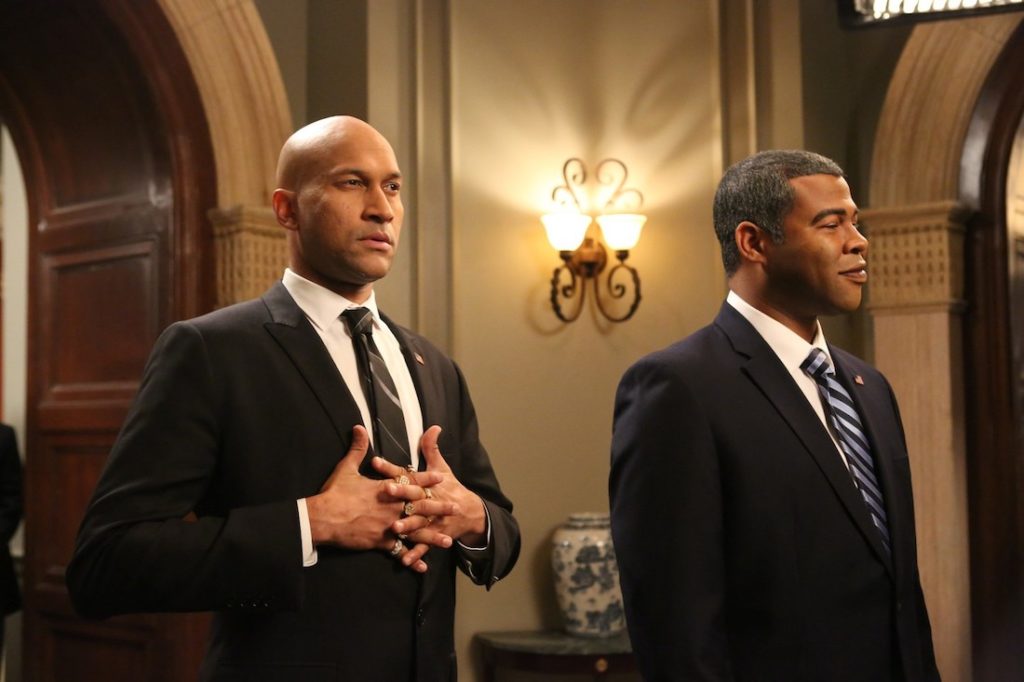
'Key & Peele'
ScreenCraft: You were a part of Upright Citizen's Brigade in New York. How important was improv in shaping you as a comedy writer?
Jackson: Improv was critical in my comedy writing career. It helped me find my voice. The UCB Theater actually has two “arms” -- an improv arm and a sketch arm. I spent most of my time diving into the improv side of things. So when I was in the UCB scene in NYC, I was known more as a performer than a writer. But still, if I had an idea for a sketch, I would gather some like-minded friends and produce it, or write a sketch show with friends and then pitch it to the theater, or if I had an idea for a short story or any creative idea, I would just get it down. So I was performing through the theater a ton and then writing and creating on my own, using the tools that I was learning to help develop my work.
Improv is all about collaboration, so it really shaped that muscle which ended up being very valuable in the writers room. Most of being a writer in a writers room is talking and building off of other people. The advertising background also helped with this -- as a Strategic Planner I was leading brainstorms, conducting focus groups and facilitating work sessions in a collaborative way as well.
But overall, I will say that UCB was also good for motivation. It was a community of people that were all trying to improve and get better at this weird art form. And in doing so, we were all helping each other find our own comedic voices while also learning how to work together. These are things that in retrospect were vital in me settling into my voice as a writer and vital to being a solid contributor in a writers room.
"A thing that I learned being in a handful of writers rooms is that you can always beat the joke or at the least, replace a good joke."
ScreenCraft: How much of comedy writing is about following the rules? Sometimes jokes land on paper but not during a shoot. How do you adapt to that on set?
Jackson: I’d say that the biggest “rule” of comedy writing is that the story has to make sense. People need to know what they’re following as they’re watching the content. A thing that I learned being in a handful of writers rooms is that you can always beat the joke or at the least, replace a good joke. But if you keep a joke that doesn’t serve the story or diverts in a way that makes the story confusing, then you run the risk of losing your audience. The joke is only as good as the audience being invested in the characters and the world that you’ve built.
And it’s very true that sometimes jokes work on paper but not on set. It’s also true that sometimes the joke works on paper and the joke works on set, and even though it works on set, you can still beat the joke on the day of the shoot. There’s something special about being on set. The script is almost like a theory, and being on set is the proof. Sometimes the formula is just what you expected -- sometimes it’s slightly different and you have to make changes -- or you have to scrap it and find something new. Being on set is my favorite aspect of the television writing process -- seeing it all come to life and making those adjustments in the moment before heading into editing.
And I guess you adapt by being honest about what’s working and what isn’t. By being kind and collaborative with your actors throughout. And by being flexible but realistic about what’s possible to achieve with the time and resources you have at your disposal.
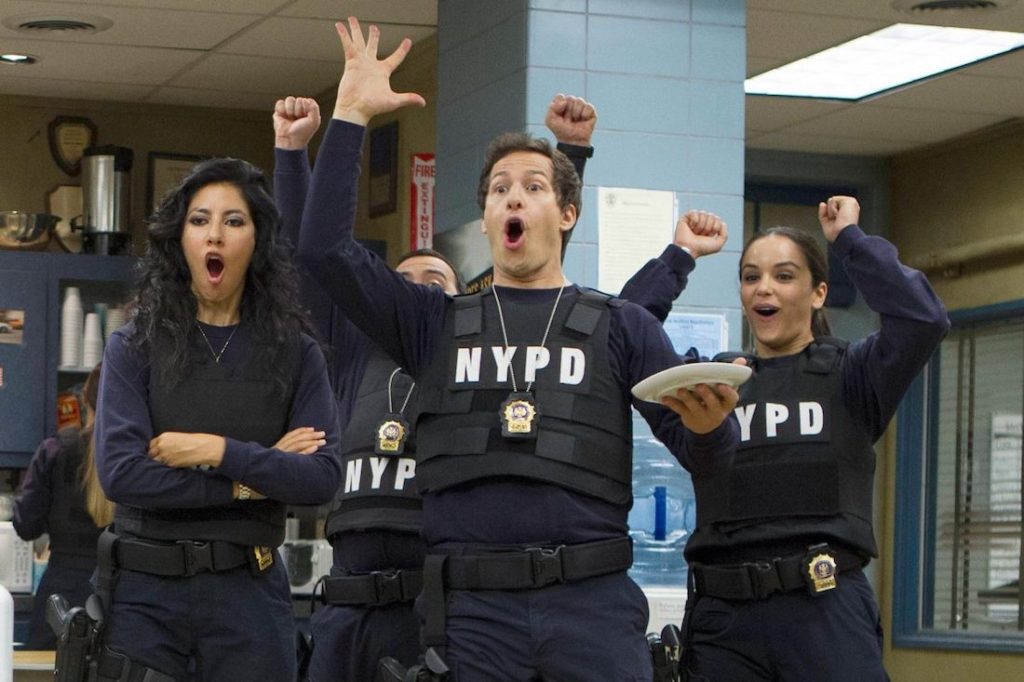
'Brooklyn Nine-Nine'
ScreenCraft: How much pitching do you have to do in a room as a writer? Also, do you prepare in advance to pitch - is it outlines or jokes or story arcs?
Jackson: To me, it feels like pitching is 90% of the job -- either pitching story or pitching jokes., character arcs, etc. Being a television writer in many ways is just being a conversationalist -- most of the time you personally are not doing the writing -- unless it’s your episode and even then there’s going to be many minds that contribute to the script you’ve written.
And when the room is coming up with a story, it’s just talking about things that could happen and how they could happen.
And preparation is always good but I think largely depends on the dynamic of the room. The showrunner will usually make it clear what type of preparation is necessary and if there’s work to take home. But when in doubt, why not prepare. It’s always good to be thinking about the show you’re working on and tells the showrunner that you’re invested at a high level.
"I take walks to help me through writer's block. I have a six-mile loop in my neighborhood that I do almost daily -- I think about stuff I’m working on then."
ScreenCraft: How do you describe your voice as a writer?
Jackson: Hmm… never thought about how to describe my own voice, here it goes:
Highly emotional, but with the levity turned up loud.
ScreenCraft: How do you balance writing for a show and writing for yourself?
Jackson: To me, it’s a matter of perspective. When I’m writing for a show, I’m doing the best I can to contribute to the Showrunner’s vision. So, it’s about using my sensibilities and skills and figuring out how they can contribute to the show. It’s about having tough skin, pitching to the best of my ability, not getting phased when my pitch gets silence, and just trusting that my thoughts are as valid and smart as anyone else’s -- because they are. You’ve been hired because you are, in theory, a good fit for the tone of the show and unique as an individual. So it’s about not getting caught up in what other people are doing and just doing you -- that’s all you can control at the end of the workday.
And then when I’m writing for myself, it’s all about my personal vision and expression. The guard rails are all my own -- I actually love working on personal projects while I’m in a room, it’s a nice juxtaposition between working on a team and creating something for myself.
ScreenCraft: What do you think is missing in the world of comedy writing?
Jackson: More people of color and women at all levels.
ScreenCraft: What helps you in the moments when you are unmotivated to write?
Jackson: I take walks to help me through writer's block. I have a six-mile loop in my neighborhood that I do almost daily -- I think about stuff I’m working on then.
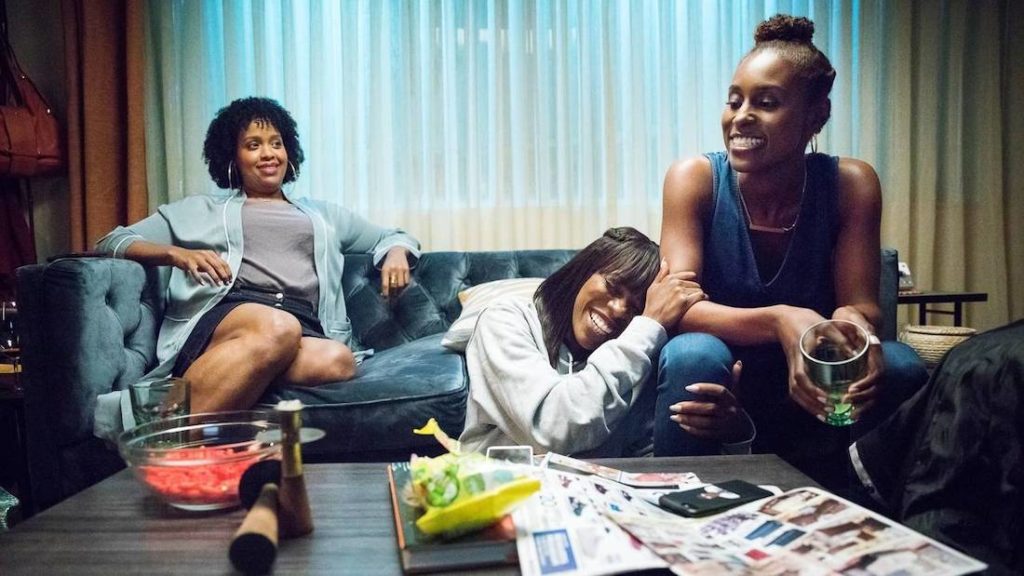
'Insecure'
ScreenCraft: How did the opportunity for writing and producing for Insecure come along and what was that writers room experience like?
Jackson: I was writing on Brooklyn Nine-Nine for four years, and it felt like it was time for something new. I had met the showrunner of Insecure, Prentice, digitally before that [we became friends on Instagram] because he wrote on Brooklyn Nine-Nine as well but we weren’t there at the same time -- I started the season after he left. I got word that Insecure was looking for an upper-level writer, and Insecure was already one of my favorite shows on top of my connection to Prentice, so I went in for an interview and it ended up working out.
The writers room on Insecure was awesome. Issa and Prentice are amazing collaborators. Issa has an amazing balance of listening and using people’s ideas while also being clear about her vision. Prentice is an amazing facilitator -- he’s also a monster when it comes to story. I learned a ton from both Issa and Prentice.
We’d pitch around the whole season and then break down the episodes one by one. It was a lot of fun -- a lot of contributing personal anecdotes and stories and working that into the show. I think that’s why the show feels so authentic, honest, and funny.
ScreenCraft: What is your writing process and what’s your favorite part of the process?
Jackson: Take a walk. Think of some ideas. Take a walk. Write down some ideas. Take a walk. Realize which idea excited me the most. Jot down a logline or short paragraph. Take a walk. Start to think about the characters in this world. Jot down bullet points of what could happen. Take a walk. Write an outline. Take a walk. Read the outline. Take a walk. Start writing the script. Take a walk. Push through the self-doubt. Take a walk. Finish a first draft. Drink some wine.
The above could take anywhere from a couple of weeks to a year or more depending on the project, but this is how it happens for me.
"Also, being open to a path that I didn’t necessarily see coming. Saying yes to what I was presented with creatively. I thought that acting was going to be my way in, and it turns out it was writing."
ScreenCraft: Advice for emerging writers on how to hone their craft when it comes to comedy writing?
Jackson: Write it down. All of it. The half idea. The full idea. The play. The pilot. Whatever it is, just write it down. Every time you write, you’re sharpening the iron.
And judge the draft and not the process. There will be plenty of time to rework and be critical about your work -- it’s much more useful to be critical once you have a draft.
Another way to put it is -- be kind and give yourself love when you’re writing the draft. And then, be diligent and give yourself tough love when you’re doing the rewrite. Not the other way around.
ScreenCraft: What has been a major contributing factor or effort on your part to open doors for yourself on your creative journey?
Jackson: Saying yes. Taking the meeting. Hopping on the round table for free. Collaborating with people that I get along with when they want me involved. Performing. Watching TV. And even while having aspirations to have my own show, treating each job that I have at the moment as if it’s the most important thing, because, in that moment, it is.
Also, being open to a path that I didn’t necessarily see coming. Saying yes to what I was presented with creatively. I thought that acting was going to be my way in, and it turns out it was writing -- I’m thankful I was open to it and not so steadfast in my pursuit that I rejected those types of opportunities.
ScreenCraft: What are you most excited to read as a judge for the ScreenCraft Comedy Competition?
Jackson: I love a good opening.
If you want to learn more about the current movers and shakers in the comedy genre for film and television, check out our blog post here.
Get Our Screenwriting Newsletter!
Get weekly writing inspiration delivered to your inbox - including industry news, popular articles, and more!



